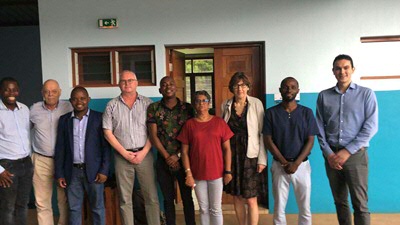Grant for stimulating agricultural education in Mozambique
Nuffic has made a grant of € 1 million available for the improvement of the quality of vocational education focusing on the agricultural sector in Mozambique. The University of Groningen is leading this project and to this end, is working together with four consortium partners.
The consortium was awarded the grant for a project with the title ‘Enhancing community and market oriented TVET (Technical, Vocational, Education and Training) programmes in agriculture in the northern region of Mozambique through an interdisciplinary evidence generating approach with focus on food and nutrition security’. The project will run from 1 January 2020 to 31 December 2021.
Entrepreneurship in agriculture
Northern Mozambique has high potential for entrepreneurship in agriculture, but existing educational programmes do not succeed in developing this potential. The objective of the project is to reorient the programmes of three agricultural TVET institutes in northern Mozambique towards labour market-oriented value chain development and higher levels of earnings and more nutritious produce for the communities involved. The agrarian faculties of the University of Lúrio and of the Catholic University of Mozambique will accompany the process with research, supported by the University of Groningen. This will contribute to their skills in community oriented research.

Consortium
Apart from the University of Groningen, the consortium consists of the Polytechnic Institute for Higher Agricultural Education in Coimbra (ESAC), Portugal and the already mentioned agrarian faculties in northern Mozambique (Portuguese speaking). Three agricultural vocational institutions in two Northern provinces of Mozambique will be supported by the agricultural faculties of Mozambican universities and their Dutch and Portuguese partners to enhance the community and market orientation of their programmes. Based on a needs and opportunities assessment, three communities of practice with each a different focus, will be formed around the three agricultural TVET institutes. These communities of practice will consist of a diversity of educational and agricultural experts and local stakeholders including youth, women and farmers’ groups. The project will enrich the local agricultural teaching practice along with the research capacity of the two agrarian faculties. Furthermore, it will strengthen the ties of the University of Groningen to Mozambique which can count on a joint history of some decades.
The Orange Knowledge Programme
The Orange Knowledge Programme is a €195-m Dutch global development programme, available in 53 developing countries and managed by Nuffic, a Dutch non-profit organization for internationalisation in education. Launched mid-2017, it aims to have provided tens of thousands with the possibility to change their future through education and training by mid-2022. Nuffic is funded by Netherlands’ Ministry of Foreign Affairs.
Meer informatie
- Contact: Jacques Zeelen or Josje van der Linden
- You can find more information at the website of Globalisation Studies Groningen
| Last modified: | 12 July 2023 4.56 p.m. |
More news
-
19 December 2024
Konstantin Mierau new Vice Dean Faculty of Arts
The Board of the University of Groningen has appointed Dr Konstantin Mierau as Vice Dean of the Faculty of Arts, effective 1 January 2025. Dean Thony Visser and Managing Director Sander van den Bos are pleased with the appointment and look forward...
-
17 December 2024
Autism in women: masking takes its toll
Women with autism are often diagnosed later than men. Researcher Yvonne Groen developed a screening tool together with her colleagues to simplify the diagnosis.
-
10 December 2024
Time will tell: what tree rings reveal about the past
Ancient DNA analysis of bones, teeth, or plants can reveal family connections, population movements, and domestication pathways. Pınar Erdil tells more about it.
